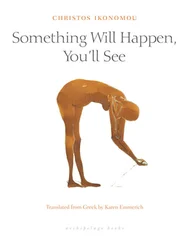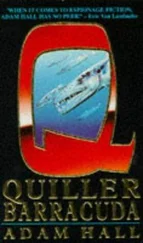This is when I have to tell him.
‘I’ll make that appointment tomorrow.’
‘Good.’ He still won’t concede. He wants me to do the work, he wants me to beg. I can’t, because if I start to apologise I won’t be able to stop. I am sorry for being lazy, I am sorry for being deceitful, I am sorry for not being good enough brave enough tough enough.
This is when I have to tell him.
‘I’m sorry.’
His hand moves, I feel his weight shift behind me; he is gently rubbing the small of my back. ‘I don’t think you want to move to Scotland, pal. I think that’s why you aren’t doing anything about organising the visa.’
This is when I have to tell him.
He stops massaging my back. ‘Is that it, Dan?’
I don’t have to tell him .
He is sitting upright now, our shoulders are touching. I can smell the stale odour of the office on him and traces of the takeaway he had for lunch.
He sighs, a deep unhappy sound, and it comes from somewhere beyond the callousness and the aloofness. It is where the tenderness is, where I will find the staunchness, where he will do anything for me. He’s scared I don’t want to go and I am scared that I can’t go. I am so terrified I can’t bring myself to say anything.
‘I guess that means you don’t want to go,’ he says frostily.
This is when I have to tell him. That I do want to go, that I want to be there when his sister Nina has the baby, that I want to meet his half-brother, meet his mother, his father and stepmother, that I want to see the neighbourhoods he grew up in, the schools he went to, the friends he made, walk the grounds of the university he attended, go to the clubs he danced in, the pubs he drank in, that I want to get to know his city, the stink of it and the beauty of it, the poverty of it and the inspiration of it. And I want to believe that when I am there I will shed my skin, become a new man. I want to go. I have to go.
But I’m scared. I’m scared that I won’t be able to.
‘Dan?’
I love the whisper of warmth he offers to my name.
This is when I tell him.
It takes an age for the words to come, to take shape, to transform into sound. I am hollowness, my voice is not my own, my body seems drained of everything that makes me human: blood and tissue and muscle and guts. But I don’t cry. I can’t cry.
‘Clyde, there’s something I have to tell you.’
He is the one afraid now, he senses the vast distance between us. His whole body has tensed, his eyes are wide and frightened.
‘I’ve been to prison.’
I haven’t really thought of his face for years, not really. I have thought of the moments before and all those millions of moments afterwards, but not of the man’s face, how it became jelly under my blows, of the blood, the cuts on my fist as I broke his face. How I did this to someone, made him insensible, took him to the edge of life.
‘I’m scared they won’t let me into the UK, Clyde, and I think they have every right not to let scum like me in.’
I can see the face, for the first time, I can see what I did, how I destroyed something. But there is that calmness inside me, it is flowing through me, sedating me. It is as though I am speaking through the narcosis of a dream.
And it is Clyde who is crying.
‘I’ve been to prison, mate. I nearly killed a man. That’s what I did. That’s who I am.’
He was standing in the motel bath, his Speedos on, his arms clasped tight across his chest. His mother was shaving his legs. The lather was pasted thick on his thighs, on his calves, and she guided the razor through it slowly, carefully, not wanting to nick him. She said, ‘Don’t move, Danny, stay still.’
He didn’t like looking down at the soapy, filthy water around his feet. His mum flicked the razor into the dirty mess. Spools of black hair floated on the surface of the foam. His legs were covered in coarse black hair. He thought it was ugly, he was pleased the hair was being shaved off, that it would be gone. But now the skin on his legs was dotted with pink blotches. ‘Don’t move,’ she warned him again. He looked up at the bathroom mirror in which he could see his brother and sister sprawled over his bed in the main room. Theo was on his back, his neck and head bent over the end of the mattress, watching the television upside down. Regan was on her belly, her elbows bent, her knuckles pressing against her chin. Her feet were kicking — up down, up down — banging on the mattress. He couldn’t see the television in the mirror but he could hear the voice of the race commentator.
‘Hurry up, Mum, the race is going to start.’
His mother ignored him. He looked down to see the razor scraping away what looked like a wad of thick dark fur, as though he was some sort of animal she was shearing. She flicked the razor in the water again and the clump of hair floated on the surface around his left foot.
‘OK, that’s your left leg done.’ His mother smiled up at him.
He was itching all over where she had just shaved him but she poured some lotion into her hand and then rubbed it up and down his calf and the back of his leg. The cool gel instantly soothed the prickliness.
‘I’m going to miss the race,’ Danny complained. He craned his neck, trying to glimpse a reflection of the television. All he could see was his brother’s upside-down head, his sister’s legs still kicking the bed.
‘Theo,’ his mother called out, ‘has the race started yet?’
‘No.’
‘You’ll tell us when it does?’
He could see the reflection of his brother nodding. The little boy caught his eye and gave him a smile but because he was the wrong way round it looked like a frown. Theo effortlessly propelled his body over the bed, landed on his feet, and ran over to the bathroom door. He watched as the razor scraped down the back of Danny’s thigh.
‘You’re really hairy.’
Their mother flicked some suds at him and the little boy shrieked, ‘Don’t!’
‘Then get out of here.’
Theo scampered back to the bed.
‘Should I close the door?’ his mother asked.
Danny shook his head. He thought it would feel strange if the door was shut, with his mother shaving his legs — it would feel a little sick. He didn’t want that thought in his head. He shivered.
‘Stop moving or I’ll nick you.’
If he was nicked, he would bleed. And if he bled, a scab would form, and he would feel it in the water, he would sense it as he was swimming. It would be just a small sensation, just a niggle. But it could be enormous. Like a fly landing on his naked shoulder over summer, when it became all he could think of. All you could think of was that small, trivial thing, but before you knew it, it would be the scab he was thinking of in the water the next day, the feel of it as the water rushed past it, an itch that would want to be scratched, that would make him pause, for a third of a third of a third of a second. But that was all it took, the Coach said it all the time, for that third of a third of a third of a second to make you lose concentration and then you would slip back, fumble a stroke, and then you would find yourself a quarter of a body length then half a body length then a whole body length behind. He couldn’t be nicked, he couldn’t dare be nicked.
He stood absolutely still.
She had shaved both his legs and still the race hadn’t started.
As she changed the water he ducked into the next room to check the TV. There were ads, then interviews with former Olympians. All they wanted to talk about was Perkins. Would he, wouldn’t he? Did he have it in him? Most of the commentators were dubious. He had barely scraped through the heat, one of them warned; another started listing the swimmer’s old injuries. The third disagreed, said proudly that just going for an Olympic medal brought something special out of a true athlete: Perkins could do it. The other commentators couldn’t answer that; they hadn’t been there, didn’t know what it felt like. To be in the pool, to be going for an Olympic medal. To have everyone in the world watching you.
Читать дальше








